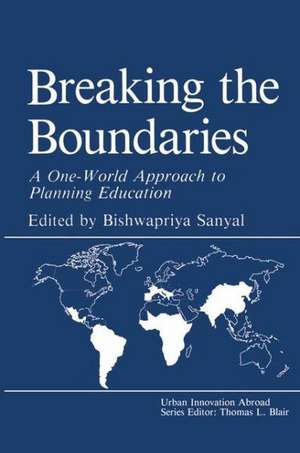Breaking the Boundaries: A One-World Approach to Planning Education: Urban Innovation Abroad
Editat de B. Sanyalen Limba Engleză Paperback – 25 noi 2012
Preț: 638.89 lei
Preț vechi: 751.64 lei
-15% Nou
Puncte Express: 958
Preț estimativ în valută:
122.25€ • 133.21$ • 103.01£
122.25€ • 133.21$ • 103.01£
Carte tipărită la comandă
Livrare economică 23 aprilie-07 mai
Preluare comenzi: 021 569.72.76
Specificații
ISBN-13: 9781468457834
ISBN-10: 1468457837
Pagini: 280
Ilustrații: 278 p.
Dimensiuni: 152 x 229 x 15 mm
Greutate: 0.38 kg
Ediția:Softcover reprint of the original 1st ed. 1990
Editura: Springer Us
Colecția Springer
Seria Urban Innovation Abroad
Locul publicării:New York, NY, United States
ISBN-10: 1468457837
Pagini: 280
Ilustrații: 278 p.
Dimensiuni: 152 x 229 x 15 mm
Greutate: 0.38 kg
Ediția:Softcover reprint of the original 1st ed. 1990
Editura: Springer Us
Colecția Springer
Seria Urban Innovation Abroad
Locul publicării:New York, NY, United States
Public țintă
ResearchCuprins
Our Approach to Planning Education — and Ourselves.- Recasting the Language of Traditional Approaches to Planning Education.- Large Commitments to Large Objectives: Planning Education for the Twenty-first Century.- Language and Power: Teaching Writing to Third World Graduate Students.- The Language of Planners: A Central Issue in Internationalizing Planning Education.- Methodological Approaches for Refinement of Planning Education: The Benefits and Limitations of Comparison.- Beyond Taoism: Comparative Environmental Planning.- Statistically Significant Differences? Students from Developing Areas and the Developing Area of Quantitative Reasoning.- Educating First and Third World Development Planners: The Role of Qualitative Evaluations.- A Comparative Approach to Housing Problems.- Developing Countries and Western Planning Approaches: Lack of Specificity as a Hindrance to Understanding.- Comparison and Choice in Urban Transportation.- Third World City Design: Values, Models and Education.- Developing Countries and Western Planning Education: The Politics of Knowledge Production.- External Precepts and Internal Views: The Dialectic of Reciprocal Learning in Third World Urban Planning.- Incongruities Between the Theory and Perception of Regional Development in Less Developed Countries: Toward Bridging the Gap.- Inequalities, Western Roots and Implementation Problems: Three Challenges to a One World Planning Education.- Afterword: Reflections on the Major Implications of Breaking The Boundaries.- Why New Perspectives are Needed.- Contributors.



















